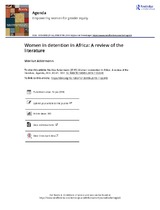| dc.description.abstract | Women in prison in Africa experience compounded discrimination due to gender and poverty. Structural inequality results in women being poorly educated, having reduced access to economic resources and legal processes. Women often remain in pre-trial detention since they are unable to afford bail or fines. A significant number of women in prison are mothers and often, the sole or primary caregiver of children prior to detention. The true impact of female detention is felt by children who are imprisoned with their mothers, or who remain alone on the outside. In addition to the profound social and economic impact on families, women in prison are affected by a number of gender-related issues, including reproductive health needs, mental health disorders connected to prior experiences of violence, abuse and substance abuse, and heightened vulnerability to sexual abuse and harassment in detention. The literature review looks at the reasons for female imprisonment in a number of African countries, and explores the unique needs of women in detention, against the backdrop of the international detention framework, and particularly, the United Nations Rules for the Treatment of Women Prisoners and Non-Custodial Measures for Women Offenders (the Bangkok Rules). | en_US |

